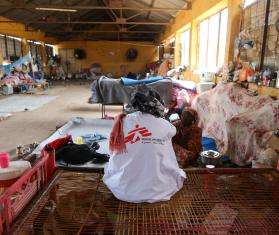MSF Treats 767 Patients; Reports Death Rate of 16.5 Percent
New York/Nairobi: January 29, 1998 — On December 27, 1997, Doctors Without Borders/Médecins Sans Frontières (MSF) set up a cholera treatment center near the Kisangani hospital in the Democratic Republic of Congo to deal with the cholera outbreak in the nearby Kapalata military camp. Since then a total of 767 patients from the camp have been treated, 460 of these for cholera. Patients are being transferred from the military camp (to which MSF has no access) to the treatment center. More than 16 percent of the patients transferred to the treatment center have died.
Every day an average of 20 patients, between the ages of 14 and 25 years, are being transferred to the MSF treatment center from the camp. According to WHO standards, 64 percent of the patients who have been transferred to the hospital are malnourished and 46 percent of those are severely malnourished. Forty-eight of the total patients were in coma or shock on admission to the center. Lice and scabies have been found among all admissions.
These high death and malnutrition rates clearly indicate that the patients have had a lack of food and water and have been living in bad sanitary conditions for a long period of time.
"Some of the patients are so malnourished that they look like skeletons," said Roland Bouwkamp, Head of Mission for MSF in Kisangani. "Sometimes we cannot do anything more for these patients and they die within hours of admission as they are too malnourished and weak to survive."
The Congolese Minister of Health, J-B Sondji from Kinshasa, visited the MSF treatment center and the military camp in Kisangani on January 26 and 27. The Minister was personally informed by MSF about the changes needed to prevent the ongoing humanitarian disaster there. Before returning to Kinshasa on Wednesday morning, the Minister assured MSF personally, and other NGOs publicly, that he would put an end to this suffering. He promised that the people from the camp would be transferred to a better site with access to enough clean drinking water, good sanitation, and a supply of food.
MSF believes that good sanitation, clean water and a regular supply of food is crucial to end this unnecessary human suffering. MSF and other organizations are willing to provide medical and other assistance at the new site, however they are not able to provide any assistance while the people are in the military camp.
MSF has been working in Kisangani, Congo, since October 1996. Programs to improve the health system for the Congolese people in Kisangani province are ongoing. An MSF water and sanitation project directed at improving water resources in and around Kisangani was started in November 1997. MSF is widely present in the rest of the Democratic Republic of Congo.



